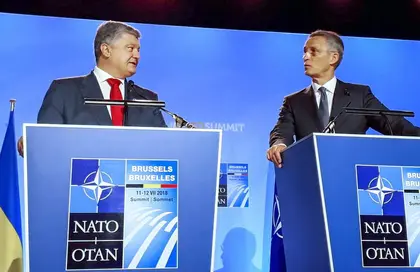BRUSSELS – NATO ministers of defense gathered in Brussels for a two-day meeting on Oct. 3-4. However, there will be no NATO-Ukraine Commission because one ally, Hungary, is continuing to block it.
Hungary has been obstructing Ukraine’s integration efforts in the European Union and NATO as a protest against Ukraine’s new education law that mandates that public schools teach classes in Ukrainian, not in the languages of minorities.
- Check the most up-to-date Ukraine news reports from today.
- Check the most up-to-date Ukraine news reports from today.
JOIN US ON TELEGRAM
Follow our coverage of the war on the @Kyivpost_official.
Hungarian Prime Minister Viktor Orban considers the measure discriminatory against the more than 100,000 ethnic Hungarians living mainly in western Ukraine’s Zakarpattya Oblast. To solve the dispute, parties started consultations but to no result so far.
The tensions fueled when Ukraine’s authorities started an investigation into Budapest’s issuing of Hungarian passports to Ukrainian citizens in Zakarpattya Oblast. Ukraine’s foreign affairs ministry said it would send a note to Hungary on Oct. 4 on the expulsion of the Hungarian consul in Berehove in Zakarpattya Oblast.
For the moment, all the meetings of the NATO-Ukraine Commission – the key format of the bilateral cooperation between Ukraine and NATO – are blocked at all levels above that of ambassadors. The last meeting of the NATO-Ukraine Commission at the level of defense ministers took place in June 2016, and at the level of the ministers of foreign affairs in March 2017. Even for the NATO Summit in July, the Alliance had to create a special format – together with Georgia – only to be able to have a meeting with Ukrainian President Petro Poroshenko.
This time, Defense Minister of Ukraine Stepan Poltorak wrote a letter to NATO Secretary General Jens Stoltenberg, asking to hold a meeting of the NATO-Ukraine Commission, but to no success.
“This letter was very positively perceived at the Headquarters,” Deputy Head of Mission of Ukraine to NATO Sergii Mukosii told journalists on Oct. 3. “There is an explanation of why there is no meeting. The most important is that the letter did not remain unanswered. Unfortunately, the Alliance can do nothing about it because of the principle of consensus when one country can block any decision. Not only Ukraine loses (from this), and not only NATO, but Hungary loses also.”
“Much has changed over these two years. The security situation has changed, the threats on the Azov Sea have increased, the situation in eastern Ukraine has changed, even the format of the operation has changed, and priorities have changed in the reform of the armed forces. We need to share our experience, and we also need NATO experience. All this should have been the subject of discussion by the Commission,” Mukosii said.
In NATO, however, nobody even mentions the word “blocking.”
“Hungary is a highly valued ally, Ukraine is a valued and important partner,” said Stoltenberg, answering a question about the dispute on Oct. 3. “One reason why NATO has strengthened collective defense is Russia’s aggressive actions against Ukraine. I hope that Ukraine and Hungary will resolve their differences, and I hope that dialogue between Budapest and Kyiv will find solutions. We’ll continue to provide support to Ukraine. President Poroshenko participated at our summit in July, we have regular meetings with the government in Ukraine, will continue to provide practical and political support.”
Off-the-record, diplomats in Brussels say that Ukraine has to show real action, but for now, even the Ukrainian parliament hasn’t been able to pass the Ukrainian Cabinet of Ministers’ proposal to introduce the transitional period for the language law until 2023.
Some experts see the confrontation as a tool for the Hungarian leadership to up their approval ratings inside the country.
Mukosii also thinks that “there is no hope of solving this situation in the future.”
“We think that this trend will continue unless this bilateral dispute is resolved,” he said. “At the same time, we hope that the allies will more actively explain to their Hungarian counterparts all the benefits of cooperation with Ukraine.”
You can also highlight the text and press Ctrl + Enter




